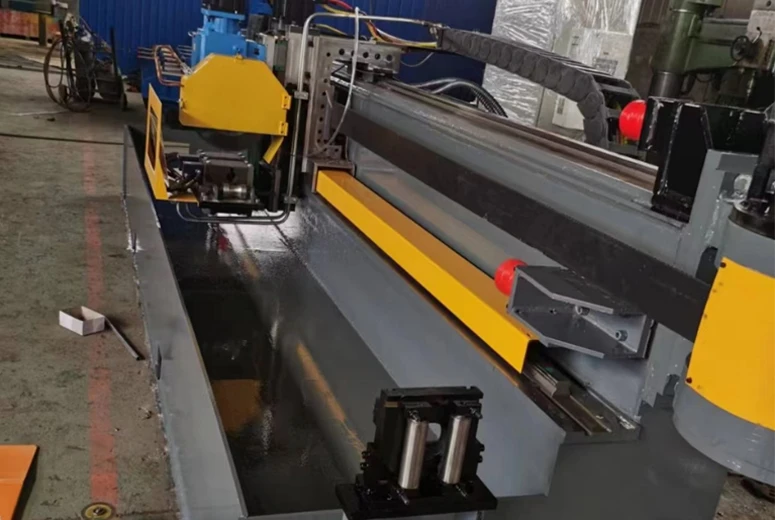round pipe welding machine
The Evolution and Significance of Round Pipe Welding Machines
In the realm of industrial manufacturing and construction, the technology of welding plays a crucial role in creating strong, durable joints between metal components. Among the various types of welding machines that have surfaced over the years, round pipe welding machines are gaining increased recognition for their efficiency and precision in fabricating cylindrical structures. This article explores the evolution, functionality, and significance of round pipe welding machines in modern industry.
Historical Development
The journey of welding machines can be traced back to the mid-19th century with the advent of arc welding. However, it wasn't until the late 20th century that specialized machines for round pipe welding began to emerge. As industries expanded, particularly in sectors like construction, aerospace, and automotive, the demand for reliable and efficient welding solutions increased. Engineers and manufacturers began developing machines designed specifically for welding round pipes, leveraging advancements in technology and materials.
Types of Round Pipe Welding Machines
Round pipe welding machines come in several types, each designed for specific applications and pipe sizes. The most common types include
1. TIG (Tungsten Inert Gas) Welding Machines Renowned for their precision, TIG welding machines are often used for stainless steel and aluminum pipes, providing clean and high-quality welds. 2. MIG (Metal Inert Gas) Welding Machines Popular for their speed and versatility, MIG machines can handle various metals and thicknesses, making them a go-to choice for mass production.
3. Submerged Arc Welding (SAW) Machines These are commonly used for larger pipes. The welding arc is submerged under a blanket of granular flux, which protects the weld zone from contaminants and improves efficiency.
4. Orbital Welding Machines Specifically designed for high-purity applications, such as pharmaceuticals or food processing, these machines create consistent, high-quality welds by rotating the electrode around the pipe.
round pipe welding machine

Each of these machines employs unique techniques that cater to different material properties and project requirements.
Advantages of Using Round Pipe Welding Machines
One of the primary benefits of round pipe welding machines is their ability to deliver uniform and repeatable welds. This consistency is particularly important in industries where strength and integrity are paramount. For instance, in the oil and gas sector, any weakness in a welded joint can lead to catastrophic failures.
Moreover, these machines reduce labor costs and time by automating the welding process. Advanced round pipe welding machines are equipped with features such as programmable logic controllers (PLCs) and computer numerical control (CNC) systems, allowing for detailed control over the welding parameters. This automation minimizes the need for manual intervention, making the process not only faster but also safer.
Applications Across Industries
The applications of round pipe welding machines are vast and varied. In construction, they are utilized for fabricating structural steel pipes used in building frameworks. In the oil and gas industry, these machines are essential for creating pipelines that transport crude oil, natural gas, and other resources. Additionally, industries like water treatment, HVAC (Heating, Ventilation, and Air Conditioning), and food processing rely on reliable pipe welding to maintain operational integrity and adherence to safety standards.
Conclusion
Although welding technology has come a long way since its inception, round pipe welding machines continue to play an essential role in shaping modern industry. Their ability to provide consistent, high-quality welds while optimizing productivity makes them indispensable in various fields. As technology further evolves, we can expect round pipe welding machines to integrate even more advanced features, ultimately pushing the boundaries of what is possible in welding applications. The ongoing demand for efficiency, precision, and strength ensures that these machines will remain a pivotal element in manufacturing and construction for years to come.
-
High Frequency Straight Seam Welded Pipe Production Line-BzZhou Xinghua Machinery Equipment Manufacturing Co., LTD.|Precision Welding, High EfficiencyNewsJul.30,2025
-
High Frequency Straight Seam Welded Pipe Production Line|BzZhou Xinghua|Precision Welding&EfficiencyNewsJul.30,2025
-
High Frequency Straight Seam Welded Pipe Production Line - BzZhou Xinghua|Precision Engineering&EfficiencyNewsJul.30,2025
-
High-Frequency Straight Seam Welded Pipe Production Line-BzZhou Xinghua Machinery Equipment Manufacturing Co., LTD.NewsJul.30,2025
-
High-Frequency Straight Seam Welded Pipe Production Line-BzZhou Xinghua Machinery Equipment Manufacturing Co., LTD.|Precision Manufacturing, High EfficiencyNewsJul.30,2025
-
High Frequency Straight Seam Welded Pipe Production Line-BzZhou Xinghua Machinery Equipment Manufacturing Co., LTD.|Precision Steel Pipe Manufacturing&Industrial EfficiencyNewsJul.29,2025


